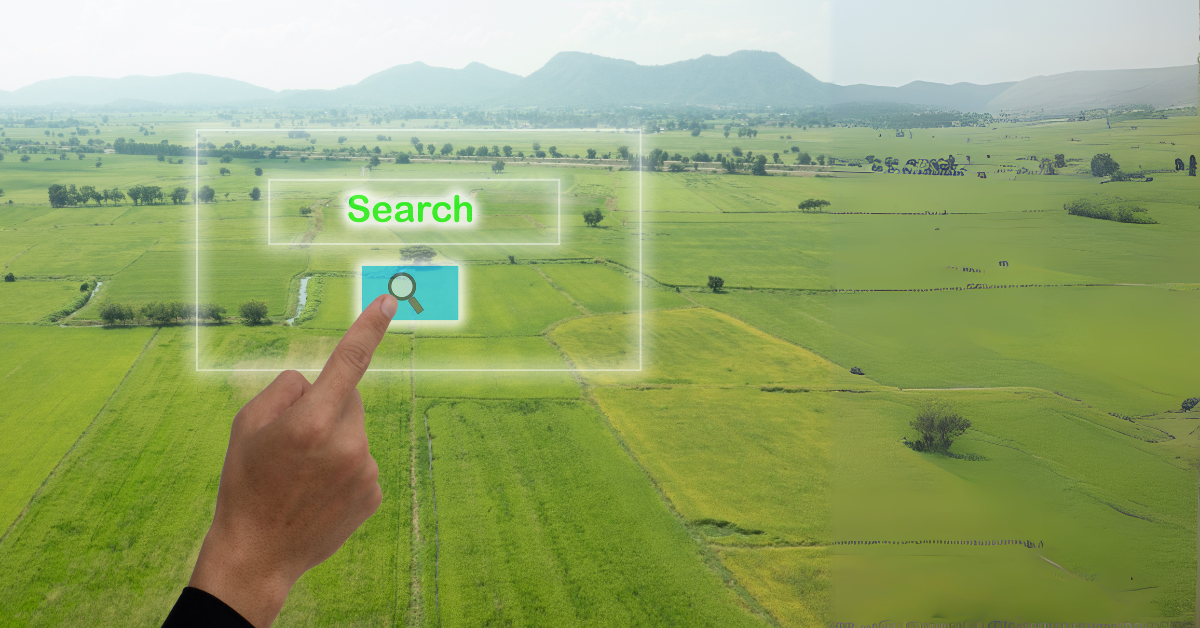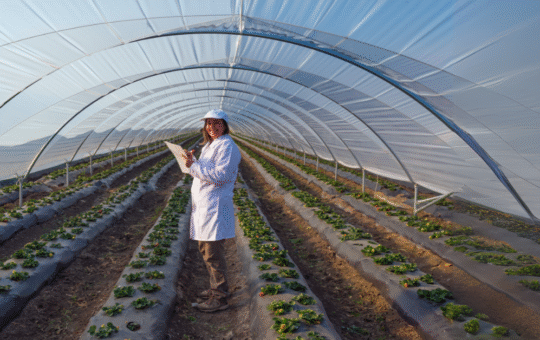
Level 4: Smart Agriculture and IoT (Internet of Things)
- Enhanced Productivity: Learn to use IoT solutions to monitor and automate agricultural processes, improving yields and operational efficiency.
- Data-Driven Decisions: Understand how IoT-based sensors and data analytics can guide decision-making for irrigation, fertilization, pest control, and more.
- Sustainability Focus: Gain insights into how smart agriculture reduces resource usage, such as water and energy, leading to environmentally sustainable farming practices.
- Future-Proof Skills: Stay ahead of the curve by mastering the skills necessary for the future of farming, where IoT and automation will become increasingly crucial.
- Improved Farm Management: Use IoT-based platforms for real-time monitoring and management of farm operations, enabling better decision-making and resource allocation.
- Understand IoT Fundamentals: Learn the basic principles of the Internet of Things and how it is applied to agriculture.
- Implement Smart Farming Technologies: Gain the skills to deploy IoT devices, sensors, and automated systems for crop monitoring, livestock management, and environmental control.
- Optimize Farm Operations: Utilize smart agriculture solutions to optimize irrigation, soil health monitoring, pest detection, and climate control systems.
- Data Collection and Analysis: Learn to collect, analyze, and interpret data from IoT devices to make informed decisions and improve farm management.
- Develop IoT Networks for Agriculture: Design and implement IoT networks for farms, including sensor placement, data transmission, and integration with cloud-based platforms.
- Integrate Automation and Remote Monitoring: Learn how to automate routine farming tasks such as irrigation and fertilization, and use remote monitoring tools for round-the-clock farm management.
- Sustainability and Resource Management: Understand how IoT helps in minimizing resource wastage, improving water usage, reducing pesticide dependence, and ensuring more sustainable farming practices.
- Create Smart Farm Business Models: Learn how to develop business models based on smart agriculture technologies and assess their feasibility and impact on profitability.
- Introduction to Smart Agriculture and IoT
- Basics of IoT and its evolution in agriculture.
- Understanding smart agriculture and its importance in modern farming.
- Overview of IoT-based farming systems and technologies.
- IoT Devices and Sensors for Agriculture
- Exploring the various IoT devices used in agriculture such as sensors for soil moisture, temperature, humidity, and nutrient levels.
- Understanding sensor networks, their operation, and data collection mechanisms.
- Hands-on practice with different IoT sensors and devices.
- Data Analytics in Smart Agriculture
- Introduction to data analytics tools used in smart agriculture.
- Methods for processing and analyzing the data collected from IoT devices.
- Using data analytics to optimize farming operations and predict crop and livestock outcomes.
- Precision Agriculture Using IoT
- Understanding precision agriculture principles and how IoT contributes to its practices.
- IoT-based solutions for monitoring crop health, soil conditions, and pest control.
- Techniques for managing irrigation and fertilization through IoT-based systems.
- Farm Automation Systems
- Exploring automation technologies in agriculture such as automated irrigation, robotic harvesters, and autonomous tractors.
- Implementing IoT-based automation systems on the farm for tasks like planting, harvesting, and crop spraying.
- IoT Networks and Cloud Platforms for Agriculture
- Understanding IoT network architecture and how it applies to farming environments.
- Introduction to cloud platforms for agriculture and how they manage and store data from IoT devices.
- Hands-on practice with cloud-based farm management platforms.
- Sustainability and Environmental Impact
- Examining how IoT technologies help reduce water usage, improve energy efficiency, and reduce the environmental footprint of farming.
- Case studies of sustainable smart farming practices in different regions.
- Business and Operational Impacts of Smart Agriculture
- Developing a business case for smart agriculture and IoT adoption.
- Assessing the economic benefits and challenges of integrating IoT solutions into farm operations.
- Strategies for managing the implementation and scalability of smart agriculture technologies.
- Smart Agriculture Specialist
- IoT Solutions Architect for Agriculture
- Precision Agriculture Technician
- Farm Automation Consultant
- Agricultural Data Analyst
- Sustainable Farming Consultant
- IoT Systems Integrator for Farms
- Farm Management Software Specialist
- Cutting-Edge Curriculum: Learn from a curriculum designed to address the latest trends in smart agriculture and IoT.
- Hands-on Training: Gain practical experience working with the latest IoT devices and smart agriculture technologies.
- Expert Instructors: Learn from industry professionals who bring real-world experience and insights into the classroom.
- Flexible Learning Options: Choose from online or in-person learning options, and study at your own pace.
- Networking Opportunities: Connect with industry leaders and peers, and engage in collaborative projects that enhance learning.
Study Units
- Introduction to Smart Agriculture and IoT
- Basics of IoT and its evolution in agriculture.
- Understanding smart agriculture and its importance in modern farming.
- Overview of IoT-based farming systems and technologies.
- IoT Devices and Sensors for Agriculture
- Exploring the various IoT devices used in agriculture such as sensors for soil moisture, temperature, humidity, and nutrient levels.
- Understanding sensor networks, their operation, and data collection mechanisms.
- Hands-on practice with different IoT sensors and devices.
- Data Analytics in Smart Agriculture
- Introduction to data analytics tools used in smart agriculture.
- Methods for processing and analyzing the data collected from IoT devices.
- Using data analytics to optimize farming operations and predict crop and livestock outcomes.
- Precision Agriculture Using IoT
- Understanding precision agriculture principles and how IoT contributes to its practices.
- IoT-based solutions for monitoring crop health, soil conditions, and pest control.
- Techniques for managing irrigation and fertilization through IoT-based systems.
- Farm Automation Systems
- Exploring automation technologies in agriculture such as automated irrigation, robotic harvesters, and autonomous tractors.
- Implementing IoT-based automation systems on the farm for tasks like planting, harvesting, and crop spraying.
- IoT Networks and Cloud Platforms for Agriculture
- Understanding IoT network architecture and how it applies to farming environments.
- Introduction to cloud platforms for agriculture and how they manage and store data from IoT devices.
- Hands-on practice with cloud-based farm management platforms.
- Sustainability and Environmental Impact
- Examining how IoT technologies help reduce water usage, improve energy efficiency, and reduce the environmental footprint of farming.
- Case studies of sustainable smart farming practices in different regions.
- Business and Operational Impacts of Smart Agriculture
- Developing a business case for smart agriculture and IoT adoption.
- Assessing the economic benefits and challenges of integrating IoT solutions into farm operations.
- Strategies for managing the implementation and scalability of smart agriculture technologies.
Upon successful completion of this diploma, learners will be able to:
- Understand IoT Fundamentals: Learn the basic principles of the Internet of Things and how it is applied to agriculture.
- Implement Smart Farming Technologies: Gain the skills to deploy IoT devices, sensors, and automated systems for crop monitoring, livestock management, and environmental control.
- Optimize Farm Operations: Utilize smart agriculture solutions to optimize irrigation, soil health monitoring, pest detection, and climate control systems.
- Data Collection and Analysis: Learn to collect, analyze, and interpret data from IoT devices to make informed decisions and improve farm management.
- Develop IoT Networks for Agriculture: Design and implement IoT networks for farms, including sensor placement, data transmission, and integration with cloud-based platforms.
- Integrate Automation and Remote Monitoring: Learn how to automate routine farming tasks such as irrigation and fertilization, and use remote monitoring tools for round-the-clock farm management.
- Sustainability and Resource Management: Understand how IoT helps in minimizing resource wastage, improving water usage, reducing pesticide dependence, and ensuring more sustainable farming practices.
- Create Smart Farm Business Models: Learn how to develop business models based on smart agriculture technologies and assess their feasibility and impact on profitability.
The Level 4 Diploma in Smart Agriculture and IoT is designed for individuals seeking to integrate technology into agriculture to increase efficiency, sustainability, and productivity. This course is perfect for:
Agricultural Professionals
Farmers, farm managers, and agricultural technicians looking to adopt advanced technologies like IoT to streamline operations, monitor crops and livestock, and improve productivity.
Technology Enthusiasts in Agriculture
Individuals with a background in technology, electronics, or engineering who want to specialize in applying IoT and automation in agriculture to enhance farming practices.
Agricultural Consultants
Consultants who wish to offer expertise in smart farming technologies, IoT solutions, and precision agriculture to help clients optimize farm operations and sustainability.
AgTech Startups and Entrepreneurs
Aspiring entrepreneurs interested in launching smart agriculture solutions, creating innovative products or services that incorporate IoT, automation, or data analytics for farming.
Environmental Sustainability Advocates
Professionals focused on sustainability who want to explore how smart agriculture can contribute to reducing resource waste, energy consumption, and the environmental impact of farming.
IoT and Data Analysts
Individuals with a background in data analysis or IoT who wish to apply their skills in the agricultural sector, helping farmers make data-driven decisions using smart technology.
Researchers and Agricultural Scientists
Researchers aiming to explore the potential of IoT in agricultural systems and its impact on crop production, pest control, water management, and farm automation.
Agricultural Policymakers
Government and non-government professionals involved in policy development for the agricultural sector, particularly with an interest in technology’s role in shaping future farming practices.
Students and Aspiring Professionals
Individuals with a keen interest in the intersection of technology, agriculture, and sustainability, seeking to build careers in the growing AgTech field.
Our assessment process is designed to ensure every learner achieves the required level of knowledge, skills, and understanding outlined in each course unit.
Purpose of Assessment
Assessment helps measure how well a learner has met the learning outcomes. It ensures consistency, quality, and fairness across all learners.
What Learners Need to Do
Learners must provide clear evidence that shows they have met all the learning outcomes and assessment criteria for each unit. This evidence can take different forms depending on the course and type of learning.
Types of Acceptable Evidence
Assignments, reports, or projects
Worksheets or written tasks
Portfolios of practical work
Answers to oral or written questions
Test or exam papers
Understanding the Structure
Learning outcomes explain what learners should know, understand, or be able to do.
Assessment criteria set the standard learners must meet to achieve each learning outcome.
Assessment Guidelines
All assessment must be authentic, current, and relevant to the unit.
Evidence must match each assessment criterion clearly.
Plagiarism or copied work is not accepted.
All learners must complete assessments within the given timelines.
Where applicable, assessments may be reviewed or verified by internal or external quality assurers.
Full learning outcomes and assessment criteria for each qualification are available from page 8 of the course handbook.
Top Courses
No results found.
Related Courses
Let's Get in touch
Deleting Course Review
Course Access
This course is password protected. To access it please enter your password below:



